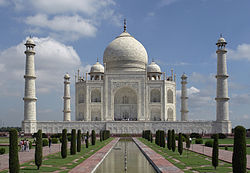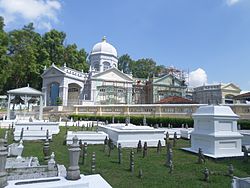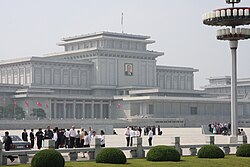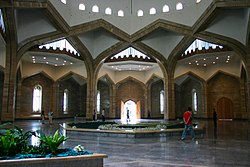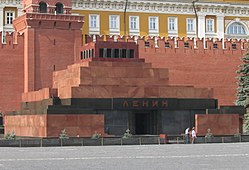Mausoleum
Burial chamber of a deceased person From Wikipedia, the free encyclopedia
A mausoleum is an external free-standing building constructed as a monument enclosing the burial chamber of a deceased person or people. A mausoleum without the person's remains is called a cenotaph. A mausoleum may be considered a type of tomb, or the tomb may be considered to be within the mausoleum.
This article needs additional citations for verification. (December 2024) |


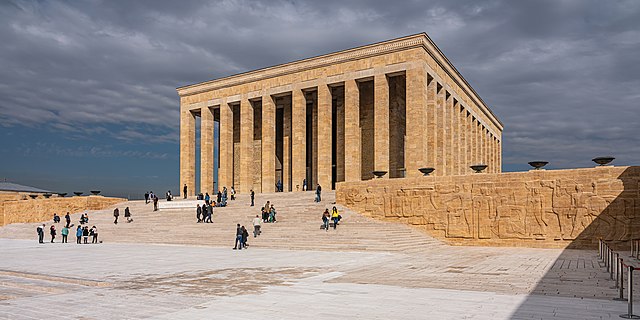

Overview
Summarize
Perspective
The word mausoleum (from the Ancient Greek: μαυσωλεῖον) derives from the Mausoleum at Halicarnassus (near modern-day Bodrum in Turkey), the grave of King Mausolus, the Persian satrap of Caria, whose large tomb was one of the Seven Wonders of the Ancient World.[1]
Mausolea were historically, and still may be, large and impressive constructions for a deceased leader or other person of importance. However, smaller mausolea soon became popular with the gentry and nobility in many countries. In the Roman Empire, these were often in necropoles or along roadsides: the via Appia Antica retains the ruins of many private mausolea for kilometres outside Rome. When Christianity became dominant, mausolea were out of use.[3]
Later, mausolea became particularly popular in Europe and its colonies during the early modern and modern periods. A single mausoleum may be permanently sealed. A mausoleum encloses a burial chamber either wholly above ground or within a burial vault below the superstructure. This contains the body or bodies, probably within sarcophagi or interment niches. Modern mausolea may also act as columbaria (a type of mausoleum for cremated remains) with additional cinerary urn niches. Mausolea may be located in a cemetery, a churchyard or on private land.
In the United States, the term may be used for a burial vault below a larger facility, such as a church. The Cathedral of Our Lady of the Angels in Los Angeles, California, for example, has 6,000 sepulchral and cinerary urn spaces for interments in the lower level of the building. It is known as the "crypt mausoleum". In Europe, these underground vaults are sometimes called crypts or catacombs.
A chapel mausoleum or mausoleum chapel in a cemetery can be used for closed-casket funeral services prior to interments.[4][5]
Notable mausoleums
Africa
Algeria
- El Alia Cemetery in Oued Smar.
- Jedars, thirteen ancient monumental Berber mausoleums located south of Tiaret.
- Madghacen, a royal Numidian mausoleum from the 3rd century, Batna.
- Royal Mausoleum of Mauretania, monumental grave of the Numidian Berber king Juba II and the Queen Cleopatra Selene II located on the road between Cherchell and Algiers, in Tipaza Province.
- The tomb of Masinissa (Soumâa) in El Khroub
- Mausoleum of Sidi Abderrahmane Et-Thaalibi in Algiers.
- Royal Mausoleum of Mauretania (Tipaza)
- Madghacen, a royal Numidian mausoleum (Batna)
- Frenda Jedars (Frenda)
- The tomb of Massinissa (El Khroub)
- Mausoleum of Sidi Abderrahmane Et-Thaalibi (Algiers)
Others
- Mausoleum of Mohammed V, monumental grave of the Moroccan sultan and king Mohammed V and his two sons, late King Hassan II and Prince Abdallah, in Rabat, Morocco.
- Agostinho Neto's mausoleum in Luanda, Angola
- Mathieu Kerekou's mausoleum in Natitingou, Benin
- Mausolée du Guide Suprême du Patriotisme in Gitega, Burundi
- Domoni, Comoros, burial place and location of Ahmed Abdallah's mausoleum, first president of Comoros
- Marien Ngouabi's mausoleum and Pierre Savorgnan de Brazza's mausoleum in Brazzaville, Republic of Congo
- Laurent Kabila's mausoleum in Kinshasa, Democratic Republic of Congo
- Mausoleum of Joseph Kasa-Vubu in Singini, Tshela, Kongo Central, Democratic Republic of Congo
- Gamal Abdel Nasser Mosque is a shrine and mausoleum in Cairo, Egypt, and the burial place of Gamal Abdel Nasser, second president of Egypt.
- The Unknown Soldier Memorial is a pyramid-shaped monument in Nasr City, Egypt
- Mastabas dating from ancient Egypt
- Al-Hussein Mosque is a shrine and mausoleum in Cairo, Egypt, and the purported burial place of Muhammad's grandson, Husayn ibn Ali
- Qalawun complex, contains the mausoleum of Qalawun in Cairo, Egypt
- King Sobhuza II Memorial Park in Lobamba, Eswatini
- Meles Zenawi's grave in the Holy Trinity Cathedral, Addis Ababa, Ethiopia
- Omar Bongo's mausoleum, a replica of the mausoleum of Mohammed V, in Franceville, Gabon
- Léon M'ba's mausoleum in Libreville, Gabon
- Kwame Nkrumah Mausoleum in Accra, Ghana
- Atta Mills's mausoleum at Asomdwee Park in Accra, Ghana
- Burma Camp military cemetery in Accra, Ghana
- Camayanne Mausoleum, monumental grave of Guinea's national heroes Samori Ture, Sekou Toure, and Alfa Yaya in the Grand Mosque of Conakry
- Amilcar Cabral's mausoleum in Bissau, Guinea-Bissau.
- Mausoleum of Félix Houphouët-Boigny, first president of Ivory Coast, in Yamoussoukro, Ivory Coast
- Mausoleum of Mzee Jomo Kenyatta, late president of Kenya, in Nairobi, Kenya
- Jaramogi Oginga Odinga's mausoleum in Bondo, Kenya
- Tom Mboya Mausoleum, Rusinga Island, Homa Bay County, Kenya
- Palm Grove Cemetery in Monrovia, Liberia
- National Hall, mausoleum of the late president William Tubman in Monrovia, Montserrado, Liberia
- Kamuzu Banda's mausoleum in Lilongwe, Malawi
- Bingu wa Mutharika, third president of Malawi, built a mausoleum in which his late first wife and Bingu himself are buried.
- The Heroes Square in Maputo, Mozambique
- Heroes' Acre in Windhoek, Namibia
- Nnamdi Azikiwe's mausoleum in Onitsha, Nigeria
- Tafawa Balewa's tomb in Bauchi, Nigeria
- Mausoleum of Obafemi Awolowo in Ogun State, Nigeria
- Sani Abacha's mausoleum in Kano, Nigeria
- John Garang De Mabior's mausoleum in Juba, South Sudan
- Julius Nyerere's mausoleum in Mwalimu Nyerere Museum Centre, Butiama, Tanzania
- Eyadema's family mausoleum in Kara, Togo
- Bourguiba mausoleum, monumental grave of Habib Bourguiba, first president of Tunisia, in Monastir, Tunisia
- Mausoleum of Levy Mwanawasa, Frederick Chiluba, and Michael Sata at the Embassy Park Presidential Burial in Lusaka, Zambia
- National Heroes' Acre in Harare, Zimbabwe
- Mausoleum of late President Frederick Chiluba at Embassy Park Presidential Burial in Lusaka, Zambia.
Asia, Eastern, Southern, Central, and Southeast
Afghanistan
- Tomb of Ahmad Shah Durrani in Kandahar, Afghanistan
- Mausoleum of Mohammad Zaher Shah (Hill of Teppe Maranjan) in Kabul
- Abdur Rahman Khan's Mausoleum in Kabul
- Bagh-e Babur, mausoleum of the founder of the Mughal Empire
Bangladesh
- Mausoleum of Kazi Nazrul Islam
- Mausoleum of Lalon Shah
- Mausoleum of Sheikh Mujibur Rahman
- Mausoleum of Three Leaders
- Mausoleum of Ziaur Rahman
China
- List of mausoleums of Chinese monarchs
- Mausoleum of the First Qin Emperor biggest underground mausoleum
- The pyramids of ancient China are also types of mausolea.
- Qianling Mausoleum in China, houses the remains of Emperor Gaozong of Tang and the ruling Empress Wu Zetian, along with 17 others in auxiliary tombs.
- Tomb and Mausoleum of Genghis Khan in Ordos City, Inner Mongolia.
- Imperial Tombs of the Ming and Qing Dynasties
- Sun Yat-sen Mausoleum, Nanjing.
- Mausoleum of Yuan Shikai, Beiguan, Anyang.
- Mausoleum of Mao Zedong, Beijing.
- Mausoleum of the First Qin Emperor in Xi'an, China
- Sun Yat-sen Mausoleum, Nanjing, China
- Mausoleum of Mao Zedong in Beijing, China
India
- Akbar's tomb, Agra
- Taj Mahal, Agra
- Qutb Shahi Tombs, Hyderabad
- Gol Gumbaz, Bijapur
- Humayun's Tomb, Delhi
- Tomb of Sher Shah Suri, Sasaram, Bihar
- Safdarjung's Tomb, Delhi
- Bibi Ka Maqbara, Aurangabad, Maharashtra
Indonesia
- Grave of Sukarno at Blitar, East Java, Indonesia
- Astana Giribangun at Karanganyar, Central Java, Indonesia
- Imogiri complex in Imogiri, Central Java is the cemetery for Mataram royals and the Hamengkubuwana Royals of Yogyakarta and Pakubuwono of Surakarta
- Mausoleum O. G. Khouw at Jakarta, Indonesia
Japan
- Mausoleums of Emperors of Japan
- Mozu Tombs in Sakai, Osaka Prefecture
- Fukakusa no kita no Misasagi (深草北陵) in Kyoto
- Sennyū-ji, Kyoto
- Tsuki no wa no misasagi (月輪陵)
- Fushimi Momoyama no Misasagi (伏見桃山陵), Kyoto
- Musashi Imperial Graveyard, is a mausoleum complex at Hachiōji, Tokyo
- Toyokuni Shrine at Higashiyama-ku, Kyoto. Mausoleum of Kampaku Toyotomi Hideyoshi, which was later destroyed by the Tokugawa clan.
- Nikkō Tōshō-gū at Nikkō, Tochigi Prefecture. It is part of the "Shrines and Temples of Nikkō", Mausoleum of Tokugawa Ieyasu, Tokugawa shōguns.
- Rinnō-ji at Nikkō, Tochigi Prefecture. The temple also administers the Taiyū-in Reibyō (大猷院霊廟), which is the mausoleum of Tokugawa Iemitsu, the third Tokugawa shōgun. Together with Nikkō Tōshō-gū and Futarasan Shrine.
- Zuihōden at Sendai, Miyagi Prefecture is the mausoleum complex of Date Masamune and his heirs, daimyō of the Sendai Domain
- Tamaudun, at Shuri, Okinawa
- Taiyū-in Reibyō at Nikkō, Tochigi Prefecture
- Tsuki no wa no misasagi in Sennyū-ji, Kyoto
- Fushimi Momoyama no Misasagi in Kyoto, Kyoto Prefecture
- The entrance to Higashi Otani Mausoleum, Kyoto
Malaysia
- Makam Pahlawan at National Mosque of Malaysia, Kuala Lumpur
- Makam Diraja Mahmoodiah at Bukit Mahmoodiah in Jalan Mahmoodiah, Johor Bahru, Johor
- Hang Kasturi Mausoleum at Jonker Walk, Melaka City, Melaka
- Kedah Royal Mausoleum at Langgar, Kota Setar District, Kedah
- Kelantan Royal Mausoleum
- Al-Ghufran Royal Mausoleum at Bukit Chandan in Jalan Istana, Kuala Kangsar
- Hang Jebat Mausoleum in Melaka City, Melaka
- Shah Alam Royal Mausoleum
- Tun Teja Mausoleum in Merlimau, Jasin District, Melaka
- Seri Menanti Royal Mausoleum
- Sultan Abdul Samad Mausoleum in Jugra, Banting, Selangor
Pakistan
- Tomb of Jahangir at Shahdara, near Lahore, Pakistan.
- Mazar-e-Quaid at Karachi, Pakistan
- Tomb of Allama Iqbal at Lahore, Pakistan
- Data Durbar at Lahore, Pakistan
- Samadhi of Maharaja Ranjit Singh in Lahore, Pakistan
- Bhutto family mausoleum, Garhi Khuda Bakhsh, Sindh, Pakistan
- Muhammad Ali Jinnah Mausoleum in Karachi, Pakistan
- Shrine of Islamic Naqshbandi saints of Allo Mahar Sharif.
- Tomb of Allama Iqbal at Lahore, Pakistan
- The exterior view of the Mausoleum of Emperor Jahangir, located in Punjab, Pakistan
Philippines
- Rizal Monument at Rizal Park in Manila, Philippines, houses the remains of Dr. Jose Rizal, national hero of the Philippines.
- Aguinaldo Shrine in Kawit, Cavite, Philippines.
- Mausoleum of the Veterans of the Revolution, enshrining participants in the 1896 revolution against the Spanish Empire.
- Quezon Memorial, in Quezon City, Philippines, houses the remains of President Manuel L. Quezon and his wife, Aurora.
- Marcos Museum and Mausoleum in Batac, Ilocos Norte, Philippines, housing the remains of President Ferdinand Marcos.
Taiwan
- National Chiang Kai-shek Memorial Hall, Taipei, Taiwan.
- National Dr. Sun Yat-sen Memorial Hall, Taipei, Taiwan.
- Mausoleum of late President Chiang Kai-shek, Taoyuan, Taiwan.
- Mausoleum of late President Chiang Ching-kuo, Taoyuan, Taiwan.
- Chen Tsyr-shiou Memorial Park, Former Mausoleum and Memorial of late Vice President Chen Cheng, Taishan District, New Taipei, Taiwan.
- Mausoleum of late President Chiang in Taoyuan, Taiwan
Others
- Konbaung tombs are a collection of mausoleums built by Konbaung Dynasty kings in Mandalay, Amarapura, and Inwa, Myanmar.
- Kandawmin Garden Mausolea, Myanmar.
- Martyrs' Mausoleum, Myanmar.
- Royal Cemetery at Wat Ratchabophit, Thailand
- Royal Tombs of the Joseon Dynasty, Korea
- Kim Koo Museum and Hyochang Park, Seoul, Republic of Korea (South Korea)
- Bandaranaike family Estate in Horagolla Bandaranaike Samadhi, Sri Lanka
- Kurjey Lhakhang, Bumthang Valley, Bumthang District, Bhutan
- Silver Pagoda, Phnom Penh, Cambodia
- Ho Chi Minh Mausoleum, Hanoi, Vietnam
- Kumsusan Palace of the Sun or Kim Il Sung Mausoleum, Pyongyang, Democratic People's Republic of Korea (North Korea)
- Ho Chi Minh Mausoleum in Hanoi, Vietnam
Asia, western
- Al-Khazneh at Petra, Jordan
- Mausoleum of Maussollos at Halicarnassus
- Mausoleum of Cyrus the Great in Pasargadae, Iran.
- Naqsh-e Rustam at Persepolis Iran, Tombs of Persian Achaemenid kings (522-486 BCE).
- Tomb of Ferdowsi in Mashhad, Iran.
- Tomb of Hafez (Hāfezieh) in Shiraz, Iran
- The Shrine of the Báb and the Shrine of Bahá'u'lláh in Haifa and Acre, Israel, respectively.
- Imam Husayn Mosque, Karbala – according to Shī‘ah belief,[6] the head and body of Husayn ibn Ali, along with all others who fell at the Battle of Karbala are buried here.
- Imam Reza shrine in Mashhad, Iran
- The Mausoleum of Khomeini in Tehran, Iran
- Anıtkabir mausoleum of Atatürk the founder of the Republic of Turkey at Ankara, Turkey
- Celal Bayar Mausoleum in Bursa, Turkey
- Adnan Menderes's Mausoleum, in Istanbul, Turkey
- Turgut Özal's Mausoleum, in Istanbul, Turkey
- Süleyman Demirel Mausoleum in Atabey, Turkey
- Mausoleum of Yasser Arafat in Ramallah, West Bank
- Sheikh Zayed Grand Mosque in Abu Dhabi, United Arab Emirates
- Mausoleum of Khomeini in Tehran, Iran
- Tomb of Hafez (Hāfezieh) in Shiraz, Iran
- Mausoleum of the Assad family in Qardaha, Syria
- The Green Dome, mausoleum of Muhammad, Abu Bakr, and Omar I, located in the Prophet's Mosque in Medina, Saudi Arabia
- The mausoleum of Imam Husayn Shrine in Karbala, Iraq
- Mausoleum of Cyrus the Great in Pasargadae, Iran
- Mausoleum of later Abbasid Caliph Ar-Rashid bi-llāh
Europe
- Imperial Crypt in Austria
- Church of Our Lady of Laeken in Belgium
- Batenberg Mausoleum in Sofia, Bulgaria
- Cathedral of Saint Domnius in Split, Croatia
- Royal Mausoleum and the Duchess of Kent's Mausoleum, Frogmore, Windsor, England
- Trentham Mausoleum near Stoke-on-Trent, England
- Juselius Mausoleum in Finland
- Les Invalides in France
- Panthéon, Paris in France
- Bismarck Mausoleum outside Friedrichsruh in northern Germany
- Lajos Batthyány's Mausoleum in Budapest, Hungary
- Mausoleum of Augustus in Rome, Italy.
- Mausoleum of Hadrian in Rome, Italy
- Pantheon, Rome in Italy
- Mausoleum of Theodoric in Ravenna, Italy
- Mausoleum of Galla Placidia in Ravenna, Italy
- Wilhelm II Mausoleum in Doorn, Netherlands
- National Pantheon / Church of Santa Engrácia in Lisbon, Portugal
- Mausoleum of Marasesti in Marasesti, Romania
- Peter and Paul Cathedral in St. Petersburg, Russia
- Cathedral of the Archangel in Moscow, Russia
- Lenin's Mausoleum in Moscow, Russia
- Hamilton Mausoleum at Hamilton, Scotland
- Damat Ali-Pasha Mausoleum, Belgrade, Serbia
- House of Flowers in Belgrade, Serbia
- House of Karađorđević Mausoleum, St. George's Church, Oplenac in Topola, Serbia
- Valle de los Caídos in San Lorenzo de El Escorial, Spain
- Les Invalides in Paris, France
- The Panthéon in Paris, France
- Jusélius Mausoleum at the Käppärä Cemetery in Pori, Finland
- Mausoleum of Njegoš in Lovćen, Montenegro
- Lenin's Mausoleum in Moscow, Russia
- House of Flowers in Belgrade, Serbia
South America
Argentina
- La Recoleta Cemetery, Buenos Aires
- Buenos Aires Metropolitan Cathedral, mausoleum of José de San Martín
- Mausoleum of Néstor Kirchner, Río Gallegos, Santa Cruz
- Cathedral of La Plata, mausoleum of Dardo Rocha
Bolivia
- Cathedral Basilica of Our Lady of Peace, La Paz, mausoleum of Andrés de Santa Cruz
- Cementerio General de Cochabamba, mausoleum of "general del pueblo" René Barrientos Ortuño
- Cathedral Basilica of Our Lady of Peace, La Paz, mausoleum of Andrés de Santa Cruz, Bolivia
Brazil
- Obelisk of São Paulo, mausoleum to the heroes of Constitutionalist Revolution in São Paulo, São Paulo
- Chico Xavier mausoleum in Uberaba, Minas Gerais
- São João Batista Cemetery, Rio de Janeiro, Rio de Janeiro
- Monument to the Independence of Brazil in São Paulo
- JK Memorial in Brasília, Federal District
- Monument to the dead of World War II, Rio de Janeiro
- The Monument to the Independence of Brazil in São Paulo houses the sarcophagi of Emperor Pedro I of Brazil (also King of Portugal as Pedro IV) and his two wives
- The Imperial Mausoleum in the Cathedral of São Pedro de Alcântara in Petrópolis, Brazil. It is the final resting place of Emperor Pedro II of Brazil and other members of the Brazilian imperial family
- A mausoleum containing the remains of several Brazilian royals, as well as those of Franciscan friars, in the Convent of Santo Antônio, Rio de Janeiro
- The Monument to the dead of World War II in Rio de Janeiro. The below grade mausoleum holds the remains of 467 servicemen of the Brazilian Expeditionary Force who died in action in Italy during World War II
- The JK Memorial is the burial place of Brazilian president Juscelino Kubitschek in Brasília, a city founded by Kubitschek himself
Chile
- Altar de la Patria of Chile
- Cementerio General de Santiago, Chile
- Altar de la Patria of Chile
Colombia
- Central Cemetery of Bogotá, Colombia
Ecuador
Paraguay
- National Pantheon of the Heroes in Asuncion, Paraguay
Peru
- Panteón de los Próceres
- Presbítero Maestro, mausoleum and museum in Lima
- Metropolitan Cathedral of Lima
- Presbitero Maestro mausoleum and museum in Lima, Peru
Uruguay
- Artigas Mausoleum, mausoleum of José Gervasio Artigas
- Monument at the entrance of the Artigas Mausoleum in Montevideo, Uruguay.
- Inside of the Artigas Mausoleum.
Venezuela
- National Pantheon of Venezuela, mausoleum of Simón Bolívar
North America
Canada
- Beechwood Cemetery in Vanier, Ottawa, Ontario
- Chapel Lawn Cemetery in Winnipeg, Manitoba[7]
- Eaton family mausoleum at Mount Pleasant Cemetery in Toronto, Ontario
- Fairview Mausoleum in Niagara Falls, Ontario[8]
- Francis Nicholson Darke's mausoleum at Regina Cemetery in Regina, Saskatchewan
- Hamilton Cemetery in Hamilton, Ontario
- Hart Massey's mausoleum at Mount Pleasant Cemetery in Toronto, Ontario
- Hillcrest Memorial Gardens in Saskatoon, Saskatchewan[9]
- Holy Cross Cemetery (Edmonton) in Edmonton, Alberta[10]
- Larson Mausoleum in Lang, Saskatchewan[11]
- Mount Royal Cemetery, Outremont, Quebec[12]
- Mountain View Cemetery (Vancouver) in Vancouver, British Columbia[13]
- Notre Dame des Neiges Cemetery, Cote-des-Neiges-Notre-Dame-de-Grace, Montreal, Quebec[14]
- Queen's Park Mausoleum in Calgary, Alberta[15]
- Sir Henry Pellatt's mausoleum at Park Lawn Cemetery in Etobicoke, Ontario
Cuba
Dominican Republic
- Altar de la Patria, mausoleum to the Founding Fathers of the Dominican Republic
- National Pantheon of the Dominican Republic
El Salvador
Guatemala
Haiti
- Haiti's National Cemetery in Port-au-Prince, where François Duvalier, who ruled from 1957 to 1971, is buried
Mexico
- El Ángel Victory column and mausoleum to the heroes of the Mexican Independence in Mexico City
- Monumento a la Revolución monument commemorating and mausoleum to the heroes of the Mexican Revolution in Mexico City
- Mexico City Metropolitan Cathedral, Mexico City
- Jardines Del Humaya, a cemetery with opulent multi-story and air-conditioned mausoleums of Mexican drug cartel members
- El Ángel Victory column and mausoleum to the heroes of the Mexican Independence in Mexico City, Mexico
- Monumento a la Revolución monument commemorating and mausoleum to the heroes of the Mexican Revolution in Mexico City, Mexico
Nicaragua
Panama
- Omar Torrijos Mausoleum, Amador, Panama City
United States
- Henry Flagler's mausoleum in St. Augustine, Florida
- Presidential memorials in the United States and Presidents' graves of the United States
- MacArthur Memorial in Norfolk, Virginia
- Crown Hill Memorial Park in Dallas, Texas
- Elmwood Cemetery and Mausoleum in Birmingham, Alabama
- Miles Mausoleum in Arlington National Cemetery
- Ferncliff Cemetery and Mausoleum in Hartsdale, New York
- Forest Lawn Memorial Park in Glendale, California
- Hillcrest Memorial Park in Augusta, Georgia
- Macon Memorial Park in Macon, Georgia
- Queen of Heaven Mausoleum in Queen of Heaven Cemetery, Hillside, Illinois
- Rose Hills Memorial Park, Whittier, California
- Wilhelm's Portland Memorial Funeral Home in Portland, Oregon
- Tacoma Mausoleum in Tacoma, Washington
- Tombs of the Uga mascots inside Sanford Stadium in Athens, Georgia
- Brigadier General Egbert Ludovicus Viele's Egyptian-style pyramid mausoleum in West Point, New York
- Rapper XXXTentacion's mausoleum at The Gardens of Boca Raton in Boca Raton, Florida
- Rapper Juice Wrld's mausoleum at Beverly Cemetery in Blue Island, Illinois
- Mausoleo a los Heroes de El Polvorín, at Cementerio Civil de Ponce in Ponce, Puerto Rico
- Mausolea in Cemetery of the Holy Rood on Long Island, New York
- The interior of the Spring Valley Mausoleum in Minnesota, listed on the National Register of Historic Places
- Percival Lowell – Mausoleum 2013 at the Lowell Observatory in Flagstaff, Arizona
Oceania
- Massey Memorial in Wellington, New Zealand, where New Zealand Prime Minister William Massey and his wife are interred.
- Savage Memorial at Bastion Point in Auckland, New Zealand, where New Zealand Prime Minister Michael Joseph Savage is interred.
- Tomb of the Unknown Soldier in the Hall of Memory at the Australian War Memorial in Canberra, Australian Capital Territory.
See also
Notes
- ^ The plurals mausoleums and mausolea are both used in English, although mausoleums is more common.
Footnotes
External links
Wikiwand - on
Seamless Wikipedia browsing. On steroids.




























